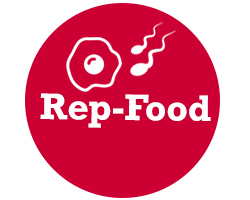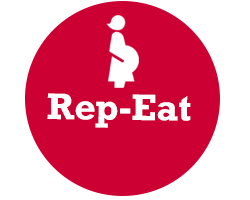About Rep-Eat
REP-EAT is a MSCA Cofund Project, supported by the EC H2020 Programme, the Region Abruzzo ESF Operational Programme 2014-2020 and the University of Teramo. The main objective of REP-EAT is to build up a new and innovative research and training doctoral programme (DP) in the interdisciplinary domain of food and healthy diet to deepen the impact of food quality on reproductive Health (REP) and eating disorders (EAT). In compliance with the concept of “One Health”, REP-EAT DP will focus on the effect of diet determinants on both humans and animals thus implying a strict integration amongst food and life science research advances. REP-EAT is aimed at training a new generation of creative, entrepreneurial and innovative Early-Stage Researchers (ESRs) in four integrated research areas.
Objectives
OBJECTIVES
To sustain technical and transversal skills.
To develop methodological and scientific research management skills Specific research objectives are set up for each of the 12 research topics.
To inform the wider scientific community, external partners, public authorities and general audience about the project and the H2020 MSCA Actions.
To present intermediate and final overall project results and ESRs individual research project’s outcomes.
QUANTIFIED INDICATORS
30 ECTS
Individual milestones, as reported in the Personal Career Development Plans in Annex 1.
Open-days (2018 UniTe joint with Rep- Biotech ITN) Multi media releases Researcher Night (2018 UniTe) Report to Public Autorities
At least 2 Short Communications
At least 1 publication in
JCR IF ≥ 2
Expected Results
- ESR1
-
Obtainment of stable olive-based micro-/nano-encapsulated extracts.
Use of olive-based encapsulated ingredients.Production of innovative food products with a high health, nutritional and sensory properties. Implementation of the application of micro- and nano-encapsulation techniques in food.
- ESR2
-
Development of nanobiosensors to apply of chemical environmental stressors, functional food elements.
Use of nanobiosensors to evaluate stressors and food effects in living organism.
Diffusion to the scientific community of novel lab-on-chip platform readily adaptable to other integrated applications.
- ESR7
-
Definition of the “probiotic” status of fermented food-associated microbes.
Guide line of fermented food/diet that can improve the maintenance of human health of the application of micro- and nano-encapsulation techniques in food.
- ESR4
-
Experimental data on lipidomic profile of blood cell membrane of healthy (dog, cat and horse) vs. pathologic animals (metabolic diseases).
Identification of the relationship of lipidomic profile as prognostic factor for clinical outcome. Definition of pharmacological/dietary regimens to overcome lipidomic aberrant profiles of novel lab-on-chip platform readily adaptable to other integrated applications.
- ESR9
-
Highlight on the gut microbiome in dogs, cats vs. humans co-habitants under physiological and pathological conditions (obesity and diabetes mellitus).
Effect of diet components on microbioma of physiological obese diabetic animals.
Diet guide line for obese or diabetic pets to adjust microbial unbalance.
- ESR10
-
Acquisition of data on the relationship of genetic background, diet, life style and obesity with several dismetabolisms, including Type2 diabetes. Role of SIRT1 in the dismetabolic diseases.
Evaluation of the molecular mechanisms involved on cellular and laboratory mammals models on the exact pathways that allow SIRT1 to prevent and/or reverse obesity-induced metabolic disturbances via Resveratrol.
- ESR3
-
Acquisition of data on molecular effect of diet on cell membranes.
Development of computational models of the effects of diet on cell membranes with experimental data.
Comparative validation of a computational model on diet effect on mammals’ spermatozoa membranes.
- ESR5
-
Experimental definition of toxicological effect of OTA dietary exposure on embryo/foetal development and pregnancy farm animals.
Establishment of the mechanisms on in vitro embryo- and FAD MSC-based models as alternative method for developmental toxicity. Guide line for dietary regimen in pregnant livestock animals.
- ESR11
-
Experimental evaluation of the relationship of genetic background, diet, life style and pollutants on cellular and laboratory animal model (i.e. breast and ovarian cancer) tumour initiation and progression.
Definition of cellular mechanisms involved in the preventive tumorigenesis action of food components.
- ESR6
-
Analyze the modifications occurring at molecular and at behavioral level after treatments with epigenetic modulators.Evaluate if drugs commercially available as dietary supplement marketed for anti-obesity therapy, also have effects at the epigenetic levels on genes of interest.Shed light into the complex relationship between ED and obesity and reproductive functioning and understand the role of gut microbiota in ED risk factors.
- ESR12
-
Identify the feasibility of advanced reproductive technologies to the livestock of endangered ovine Regional species. M36: Evaluation of nutritional regimen to improve the advanced use of ovine gametes in ART.
M48: Define the possibility of use ART to expand traditional ovine breeds within an extensive farming context for the production of high quality meet.
Rep-Eat - H2020-MSCA-COFUND-2015
University of Teramo - Via Renato Balzarini 1 - 64100 - Teramo (TE) - Italy

REP_EAT MSCA Co-funding of regional, national and international programmes (COFUND) HORIZON 2020” – Grant Agreement N. 713714.CUP: C47B16000360007






